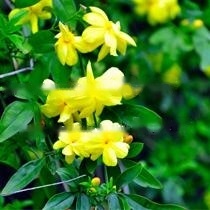
Chinese name: Yingchunhua
Latin name: Jasminum nudiflorum
Alternative name: small yellow flower, golden belt, yellow plum, Qingming flower
Mesh: Scrophulariaceae
Name and year: Lindl., 1846
English name: Winter Jasmine
1. The shape of the spring flower
Flowers solitary in leaf axils of last year's branchlets, sparsely at the tip of branchlets; bracts leaflet, lanceolate, ovate or elliptic, 3-8 mm long, 1.5-4 mm wide; pedicels 2 -3 mm; calyx green, 5-6 lobes, narrow lanceolate, 4-6 mm long, 1.5-2.5 mm wide, apex acute; corolla yellow, 2-2.5 cm in diameter, corolla tube 0.8-2 cm long , base 1.5-2 mm in diameter, gradually enlarged upward, 5-6 lobes, oblong or oval, 0.8-1.3 cm long, 3-6 mm wide, apex acute or blunt. Flowering in June.
2. Habits of the jasmine jasmine
The jasmine jasmine is fond of light, slightly shade-tolerant, slightly cold-tolerant, and afraid of waterlogging. It can overwinter in the open field in North China and Yanling, requiring a warm and humid climate , loose fertile and well-drained sandy soil, vigorous growth in acidic soil, poor growth in alkaline soil. Strong root germination. The parts of the branches that touch the ground are very easy to root. Produced in Gansu, Shaanxi, Sichuan, northwestern Yunnan, and southeastern Tibet in China. In the thickets on hillsides, 800-2 000 meters above sea level. Commonly cultivated in China and around the world.
3. Planting of jasmine flowers
Cuttings can be carried out in spring, summer and autumn. Moist, about 15 days to root. Bury the longer branches in the sandy soil shallowly without incision, take root after 40-50 days, and transplant them separately from the mother plant in the spring of the following year. It can be done in spring when the buds are sprouting. When transplanting in spring, cut off a part of the branches on the ground, and need to bring the soil. During the growth process, pay attention that the soil can not be waterlogged and excessively dry, and fertilize properly 2-3 times before and after flowering. In autumn and winter, it should be pruned and reshaped to keep more new flowers. Yingchun forms flower buds on 1-year-old branches, and blooms from late winter to spring in the second year. Therefore, all flower branches should be pruned after the flowers fade each year to promote the growth of more side branches, increase the amount of flowers, and strengthen fertilizer and water management.
Guess you like it
Hyacinth | Fortune Tree | >FishXingcao|Yew|Lemon| Lucky Bamboo|Egg fruit
Chrysanthemum| Clivia| Lotus| | forget me not | aloe vera | saffron | sunflower | lily of the valley | betel nut |
![[Dog Training 5] The training method of pet dog dining etiquette](/static/img/12192/12192_1.jpg)




